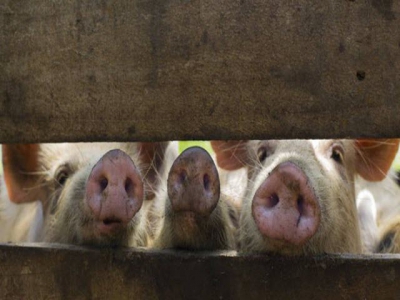Research links experimental transmission of ASF virus through feed

Kansas State research study details infectious dose of African swine fever virus in contaminated feed or liquid.
As an African swine fever (ASF) outbreak has moved rapidly throughout China and threatens to spread to new countries in Europe, a Kansas State University researcher continues research meant to understand the possible routes for disease introduction and transmission.
Megan Niederwerder, Kansas State University assistant professor of diagnostic medicine and pathobiology in the College of Veterinary Medicine, is leading a team that is exploring how the currently circulating strain of ASF could spread in feed and feed ingredients. A new publication details the dose necessary to transmit the disease when pigs ingest virus-contaminated feed or liquid, the university said in an announcement.
"Although feed and feed ingredients are a less recognized transmission route for ASF, the global distribution of feed ingredients makes this pathway important to consider for transboundary introduction of the virus," Niederwerder said. "This study is the first to demonstrate that (the virus) can be easily transmitted through the natural consumption of contaminated feed and liquid."
The study, "Infectious Dose of African Swine Fever Virus When Consumed Naturally in Liquid or Feed," was published in Emerging Infectious Diseases. Niederwerder and collaborators found that the level of virus required to cause infection in liquid was extremely low, demonstrating the high infectivity of the ASF virus through the oral route, Kansas State said.
Although greater concentrations of virus were required to cause ASF infection through feed, a high frequency of exposure may increase the risk of transmission through contaminated feed, according to the announcement.
"Working with statistician Trevor Hefley, we were able to model the probability of African swine fever infection when pigs consumed a contaminated batch of feed over time," Niederwerder said. "The likelihood of infection increased dramatically after even 10 exposures, or consumption of 1 kg of contaminated feed. Modeling multiple exposures increases the applicability of our experimental data to what would occur at the farm."
Niederwerder and her group conduct their work in the Biosecurity Research Institute, a Biosafety Level-3 facility that has helped them perform large studies, the university said. Their first study found that the ASF virus could survive in a simulated overseas feed shipment. The next step will be to identify ways to reduce or eliminate this risk, including chemical additives, storage time, heat treatments or other steps, according to the announcement.
"African swine fever is arguably the most significant threat to worldwide swine production," Niederwerder said. "With no effective vaccine or treatment, preventing introduction of the virus is the primary goal of countries free of the disease. Our hope is that this research will further define possible routes of disease spread and develop mitigation strategies to prevent introduction into the U.S. swine herd."
The National pork checkoff and the Kansas National Bio & Agro-defense Facility Fund provided funding for the study.
Có thể bạn quan tâm
 Can increased hydration save piglets and add pounds?
Can increased hydration save piglets and add pounds? Tonisity is offering U.S. swine producers free trials of Tonisity Px, an isotonic protein drink, to see if it will help them wean more, heavier piglets.
 Algae-based β-glucan may provide gut, immune boost for piglets
Algae-based β-glucan may provide gut, immune boost for piglets Piglets facing an immune challenge from E. coli may see an improvement to gut health and immune functioning from algae-derived β-glucan in their feed
 Testing feed samples for the presence of salmonella
Testing feed samples for the presence of salmonella A research project, run by the AFIA, is aimed at assessing the potential for salmonella to be present in feed.